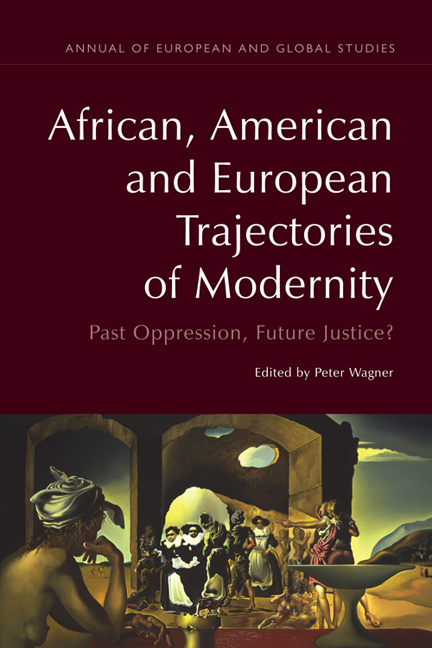Book contents
- Frontmatter
- Contents
- List of Figures
- Introduction
- Part I Reconstructing the History of Atlantic Modernity
- 1 The American Divergence, the Modern Western World and the Paradigmatisation of History
- 2 The Limits of Recognition: History, Otherness and Autonomy
- 3 On Being in Time: Modern African Elites and the Historical Challenge to Claims for Alternative and Multiple Modernities
- 4 The Sublime Dignity of the Dictator: Republicanism and the Return of Dictatorship in Political Modernity
- 5 The Luso-Brazilian Enlightenment: Between Reform and Revolution
- Part II Comparing Trajectories of Modernity in the South
- Part III Claims for Justice in the History of Modernity and in its Present
- Notes on the Contributors
- Index
5 - The Luso-Brazilian Enlightenment: Between Reform and Revolution
from Part I - Reconstructing the History of Atlantic Modernity
Published online by Cambridge University Press: 05 August 2016
- Frontmatter
- Contents
- List of Figures
- Introduction
- Part I Reconstructing the History of Atlantic Modernity
- 1 The American Divergence, the Modern Western World and the Paradigmatisation of History
- 2 The Limits of Recognition: History, Otherness and Autonomy
- 3 On Being in Time: Modern African Elites and the Historical Challenge to Claims for Alternative and Multiple Modernities
- 4 The Sublime Dignity of the Dictator: Republicanism and the Return of Dictatorship in Political Modernity
- 5 The Luso-Brazilian Enlightenment: Between Reform and Revolution
- Part II Comparing Trajectories of Modernity in the South
- Part III Claims for Justice in the History of Modernity and in its Present
- Notes on the Contributors
- Index
Summary
THROUGH THE EIGHTEENTH century, the European sociopolitical order suffered crucial challenges. New world views arose from critical reflections about the social and political life in the context of the Enlightenment. In the political realm, a process of secularisation, with the questioning of the religious legitimacy of political power, and the decline of the ancien régime, with the delegitimisation and gradual abandonment of the principles and practices of absolutism, are regarded as the main transformations of the period [Hobsbawm, (1962) 1996; Habermas, (1996) 2002].
The Portuguese intellectual milieu at that period is generally identified as being radically different from that of the rest of Europe. The Enlightenment was supposedly absent from the Portuguese Empire as a result of the rejection of modern ideas by conservative world views and projects. In this chapter I argue in the opposite direction, claiming that there was a Luso-Brazilian Enlightenment which is ignored owing to an erroneous account of the Enlightenment as a homogeneous intellectual movement, inevitably associated with the ‘death’ of the ancien régime and the critique of religious authority and theological world views. Adopting a plural conception of Enlightenment, I show through the Portuguese case that this movement was far from uniform, and does not necessarily lead to a revolutionary critique of religion and absolutism. Even within itself, the Luso-Brazilian Enlightenment was plural and eclectic, supporting both critiques and defences of the absolute power of the king, endorsing simultaneously a secularisation process, the promotion of reason and Roman Catholicism, and fostering not only revolutionary projects but also conservative state reforms.
The Plurality of Enlightenment
Traditionally, the Enlightenment is portrayed as a homogeneous movement of ideas that emerged in Europe around the mid-seventeenth up to the end of the eighteenth century, putting forward a social, political and cultural project that was based on three central elements: reason, freedom, and individualism. Additionally, it is depicted as inherently revolutionary, having replaced the epistemological authority of God with the secular authority of reason. Thus, the Enlightenment enacted a major rupture in the foundations of knowledge, being the main force behind the process of secularisation and the emergence of modern rationalism.
- Type
- Chapter
- Information
- African, American and European Trajectories of ModernityPast Oppression, Future Justice?, pp. 101 - 122Publisher: Edinburgh University PressPrint publication year: 2015



